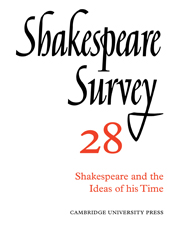Book contents
- Frontmatter
- ‘Richard II’ and the Realities of Power
- The Politics of Corruption in Shakespeare’s England
- Literature without Philosophy: ‘Antony and Cleopatra’
- Self-consciousness in Montaigne and Shakespeare
- ‘Measure for Measure’: The Bed-trick
- Shakespeare and the Doctrine of the Unity of Time
- ‘Coriolanus’ and the Body Politic
- ‘Titus Andronicus’, iii, i, 298–9
- ‘The Merchant of Venice’ and the Pattern of Romantic Comedy
- The Integrity of ‘Measure for Measure’
- ‘To Say One’: An Essay on ‘Hamlet’
- ‘The Tempest’ and King James’s ‘Daemonologie’
- Sight-lines in a Conjectural Reconstruction of an Elizabethan Playhouse
- The Smallest Season: The Royal Shakespeare Company at Stratford in 1974
- The Year's Contributions to Shakespearian Study 1 Critical Studies
- 2 Shakespeare’s Life, Times, and Stage
- 3 Textual Studies
- Index
- Plate section
The Year's Contributions to Shakespearian Study 1 - Critical Studies
Published online by Cambridge University Press: 28 March 2007
- Frontmatter
- ‘Richard II’ and the Realities of Power
- The Politics of Corruption in Shakespeare’s England
- Literature without Philosophy: ‘Antony and Cleopatra’
- Self-consciousness in Montaigne and Shakespeare
- ‘Measure for Measure’: The Bed-trick
- Shakespeare and the Doctrine of the Unity of Time
- ‘Coriolanus’ and the Body Politic
- ‘Titus Andronicus’, iii, i, 298–9
- ‘The Merchant of Venice’ and the Pattern of Romantic Comedy
- The Integrity of ‘Measure for Measure’
- ‘To Say One’: An Essay on ‘Hamlet’
- ‘The Tempest’ and King James’s ‘Daemonologie’
- Sight-lines in a Conjectural Reconstruction of an Elizabethan Playhouse
- The Smallest Season: The Royal Shakespeare Company at Stratford in 1974
- The Year's Contributions to Shakespearian Study 1 Critical Studies
- 2 Shakespeare’s Life, Times, and Stage
- 3 Textual Studies
- Index
- Plate section
Summary
In the subtlety of its critical argument and the richness and scope of the learning that informs it, Shakespeare’s Living Art is by any standards a distinguished work of literary scholarship; sadly, those qualities are also the measure of our loss in Rosalie Colie’s death shortly after she had completed this book. Its concern is with Shakespeare’s treatment of genres and literary conventions, with the ways in which he ‘used, misused, criticized, recreated, and sometimes revolutionized the received topics and devices, large and small, of his artful craft’. Far from reducing the complexity of Shakespeare’s work by merely identifying the conventional, this approach finds that Shakespeare’s ‘interest in the traditional aspects of his art lay precisely in their problematical nature, not in their stereotypical force’, and that what is ‘problematical’ in matters of form and style has to do also with the problems of living that are dramatised.
From this point of view we are invited to consider, for instance, the competing stylistic roles that are assumed and discarded in Love's Labour's Lost, the new dramatic reality that is given to conventional metaphors from the sonnet tradition in Romeo and Juliet and Othello, and the reassessments of pastoralism that underlie As You Like It, King Lear and the last plays.
- Type
- Chapter
- Information
- Shakespeare Survey , pp. 149 - 164Publisher: Cambridge University PressPrint publication year: 1975

